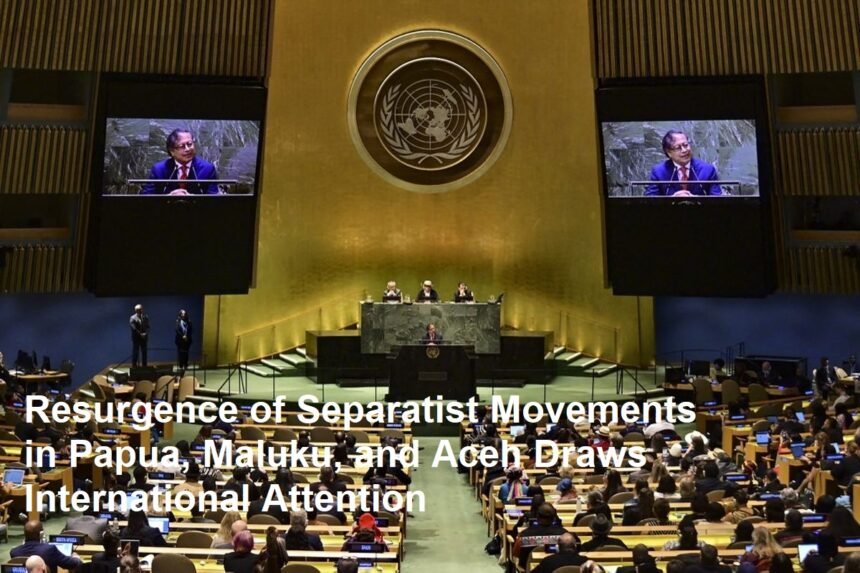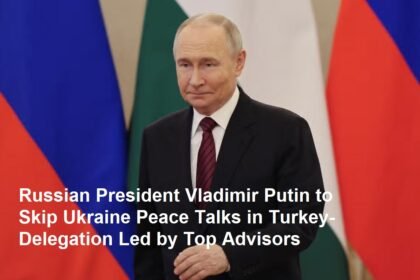The recent appearance of slogans such as “Free Aceh,” “Free Maluku,” and “Free Papua” at the United Nations Permanent Forum on Indigenous Issues (UNPFII) has reignited global discussions about Indonesia’s long-standing separatist movements. The incident occurred during the opening session of the 24th UNPFII, scheduled to take place from April 21 to May 2, 2025, highlighting how these regional conflicts remain a sensitive and unresolved issue for the Indonesian government. While Jakarta has consistently emphasized national unity, the internationalization of these movements underscores lingering grievances and the complex interplay of historical, political, and human rights factors.
Historical Context of Separatism
The roots of separatist movements in Aceh, Papua, and Maluku trace back to Indonesia’s early years as an independent nation. Each region has distinct historical narratives of resistance, often tied to perceived marginalization, cultural identity, and resource exploitation.
- Aceh: Known for its strong Islamic identity, Aceh fought a decades-long insurgency led by the Free Aceh Movement (GAM), which sought independence due to grievances over central government control and unequal revenue sharing from its natural resources. The 2005 Helsinki Peace Agreement ended the conflict, granting Aceh special autonomy. However, recent tensions suggest that some groups remain dissatisfied with Jakarta’s implementation of the accord.
- Papua: The Papua conflict is Indonesia’s most active separatist struggle. The region, incorporated into Indonesia in 1969 via a controversial UN-backed referendum, has witnessed persistent armed resistance by groups like the Free Papua Organization (OPM). Allegations of human rights abuses by security forces, cultural marginalization of Indigenous Papuans, and discontent over the exploitation of Papua’s vast mineral resources have fueled demands for self-determination.
- Maluku: The South Maluku Republic (RMS) movement, which declared independence in 1950, stems from historical resistance to integration into Indonesia. While RMS activity has dwindled, sporadic demonstrations and symbolic gestures, such as raising the RMS flag, reflect enduring aspirations among some Maluku communities.
The UNPFII Incident: A Platform for Advocacy
The appearance of pro-independence slogans at the UNPFII—a forum dedicated to Indigenous rights—signals attempts by activists to globalize their struggles. Advocacy groups argue that Indigenous Papuans and other communities face systemic discrimination, environmental degradation from extractive industries, and militarization. By leveraging international platforms, they aim to pressure Indonesia through diplomatic channels and garner support for self-determination.
However, Indonesia has vehemently opposed such efforts, asserting that these movements threaten its sovereignty. The government maintains that special autonomy policies and economic development programs address regional disparities. In Papua, for instance, infrastructure projects and affirmative action policies have been prioritized, though critics argue these fail to resolve core political and human rights issues.
Government Response and National Unity
Jakarta has long treated separatism as a red line, invoking the nation’s “Unitary State of the Republic of Indonesia” (NKRI) principle. Security forces have clamped down on separatist activities, particularly in Papua, where internet shutdowns and restrictions on foreign media access are common during unrest. The government also accuses external actors, including foreign NGOs and diaspora groups, of inflaming tensions.
In response to the UNPFII incident, Indonesian officials reiterated their commitment to dialogue within the framework of NKRI. Coordinating Minister for Political, Legal, and Security Affairs Hadi Tjahjanto stated, “Indonesia’s territorial integrity is non-negotiable. We are open to addressing grievances through existing legal mechanisms, not separation.”
International Reactions and Implications
The incident has drawn mixed reactions globally. While some countries and human rights organizations support Indigenous advocacy, others, including ASEAN members, have backed Indonesia’s stance on sovereignty. The UN itself walks a delicate line, balancing its mandate to protect Indigenous rights with respect for member states’ territorial integrity.
For Indonesia, the challenge lies in addressing root causes—inequality, injustice, and cultural erosion—without compromising national unity. The government’s development-centric approach, while impactful in reducing poverty, often overlooks demands for political autonomy. Meanwhile, the militarization of conflict zones like Papua risks further alienating local populations.
Looking Ahead
As the 2025 UNPFII session approaches, Indonesia faces mounting pressure to engage constructively with Indigenous and separatist voices. A potential path forward could involve expanding autonomy packages, ensuring transparent investigations into human rights abuses, and fostering inclusive economic growth. Conversely, ignoring these issues may only amplify global scrutiny and perpetuate cycles of resistance.
The resurgence of “Free Papua,” “Free Maluku,” and “Free Aceh” slogans serves as a reminder that Indonesia’s unity is not yet set in stone. While the nation has made strides in post-conflict recovery, lasting peace will require reconciling national cohesion with the diverse aspirations of its peoples.









